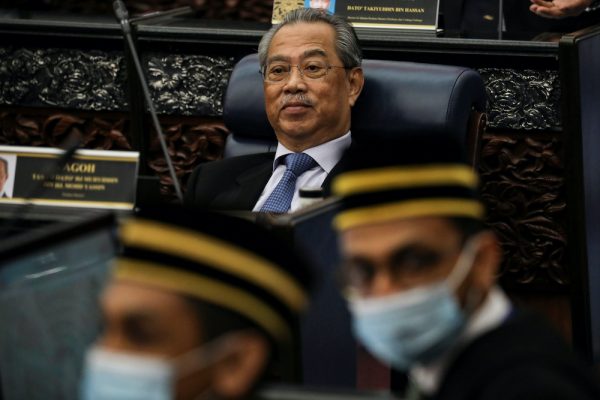First, elite-level patronage has been supercharged. Spurred by the precariousness of Perikatan’s new position and the fearsomeness of COVID-19, the coalition rushed to disperse positions and patronage across its factions and parties. The coalition’s ministers, their deputies and special envoys with cabinet rank swelled from 55 members under the previous Pakatan Harapan (Alliance of Hope) government to 70 today. As a Pakatan MP ruefully observed, ‘this is a cabinet where everyone gets his piece’.
But even so distended, the bloated cabinet was unable fully to satisfy Perikatan’s appetites. Many professional managers were ousted from the country’s long roster of government-linked companies in order to make way for restless aspirants. Sarawak Report essayed that ‘since many of the MPs thus rewarded are naturally unsure how long this COVID-19 coup might last, they are taking the opportunity to cash in quick’.
While Perikatan generously provisioned its own parties, it quarantined those in opposition, deploying public resources in stark partisan fashion. The coalition’s new Prime Minister Muhyiddin Yassin chairs the National Security Council, the main agency for pandemic planning. The inaugural meeting excluded officials from states still under Pakatan control. Though the council later relented, it refused again to engage these officials when deciding on reopening a range of business sectors in June.
The pettiness of this partisanship runs deeper. For example, while foodstuffs were gathered at collection centres for issuance by Perikatan MPs to their constituents under lockdown, their Pakatan counterparts were blocked from making the same deliveries.
To blunt the criticism that followed, the Minister of Home Affairs rolled back the scant advances in civil liberties that had been made earlier by Pakatan. The Sedition Act, the Penal Code, and the Communications and Multimedia Act were vigorously imposed. Some 262 investigative papers were launched against media postings deemed seditious during the first half of 2020 compared to just 78 in 2019. In particular, they targeted social media comments on the ‘royal institution’ and ethnic ‘sovereignty rights’.
Assembly freedoms were likewise truncated, leading to the detention of protesters for violating lockdown. The military was deployed to enforce orders, marking its first showing on Malaysia’s streets since the ‘May 13th incident’ in 1969.
Even where social media outlets remained open, they were often misused by citizens. Popular commentary erupted in contempt for the country’s vast ranks of migrant workers and refugees living in crowded quarters, vilifying them as unhygienic super-spreaders.
More broadly, the rule of law in Malaysia has weakened, evident in the drastically uneven punishments meted out for breaching lockdown. For example, a Perikatan minister and the daughter of the United Malays National Organisation’s president were fined nominal sums for respectively having lunched with school officials and strolling about in Putrajaya. Meanwhile, ordinary citizens who ran afoul of the order, only to jog or meet friends, were sometimes incarcerated for weeks.
The judiciary treated elites favourably in other ways too. In May, charges against the step-son of former prime minister Najib Razak over his receiving money from 1MDB (1Malaysia Development Berhad) were dropped. Shortly afterward, some 46 charges against the former chief minister of Sabah, Musa Aman, over his involvement in corrupt timber dealings were also dropped, owing, as the Attorney-General insisted, to missing bank records and the deaths of witnesses.
In noting the disparities in penalties between elites and ordinary citizens, a former finance minister, Daim Zainuddin, said that ‘in Malaysia, when you steal Milo, you go to jail, but when you steal billions of ringgit, you walk away smiling’. Accordingly, the president of Transparency International (TI), Muhammad Mohan, fretted over the country’s upcoming scores on the TI Corruption Perceptions Index.
More than weakening civil liberties and the rule of law, Perikatan sought to avoid accountability in parliament. Thus, in protecting its fragile legislative majority — though officially to help contain the pandemic — Perikatan postponed and then shortened the parliament’s first session in May to a mere half-day, during which only the King’s opening address was featured. No debate or question time were permitted. Further, after parliament resumed in July, government MPs, by a vote of 111 to 109, backed Muhyiddin’s motion for the ouster of the House Speaker. The opposition’s no confidence motion was then pushed to the bottom of the order paper, making it unlikely to be heard. And its questions submitted over 1MDB were rejected by the House secretary as sub judice, that is, related to criminal trials still underway.
Meanwhile, as Perikatan worked tirelessly to dispense patronage, its new ministers often performed woefully in practical matters of disaster management. The new health minister infamously recommended drinking hot water to kill the virus, and the environment minister suggested a deep cleaning of sewer systems to prevent its spread. The government issued incomplete or contradictory orders, exacerbating uncertainty and panic buying. Further, a three-stage economic stimulus package, heralded by Perikatan as distributing some RM250 billion (US$59 billion), actually amounted to a modest disbursement of RM25 billion (US$5.8 billion) — slightly more than the documented losses of 1MDB.
And yet, through it all, healthcare workers and civil servants in the Ministry of Health have shown substantive competency. In his nightly television appearances, Ministry of Health Director-General Hisham Noor Abdullah conveys an expert understanding of pandemic control, delivering much-needed assurance to Malaysia’s citizens, as well as a suitable cover for the fractious new Perikatan government.
William Case is Professor and Head of the School of Politics, History and International Relations at the University of Nottingham Malaysia.
This article is part of an EAF special feature series on the novel coronavirus crisis and its impact.

